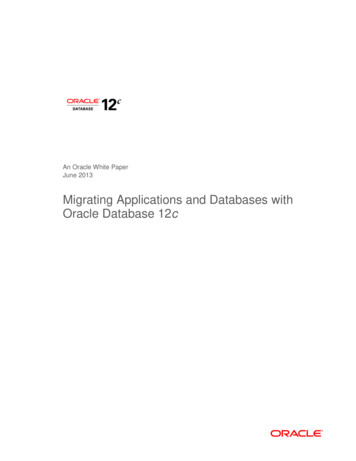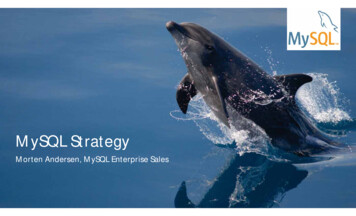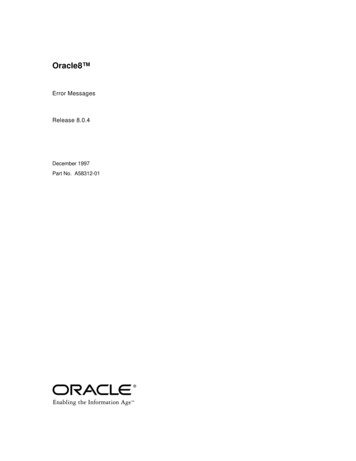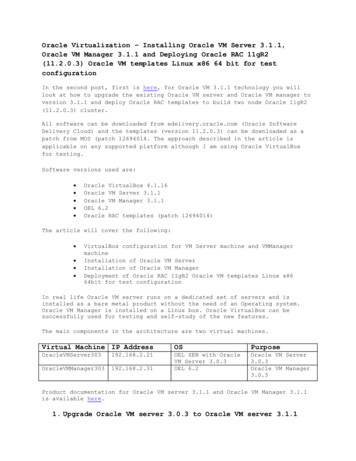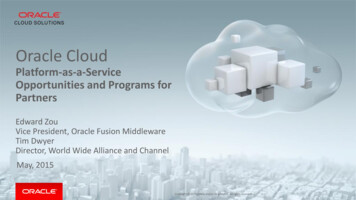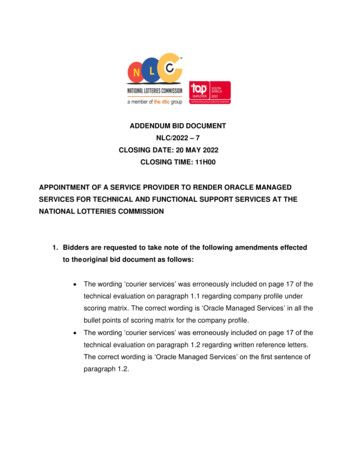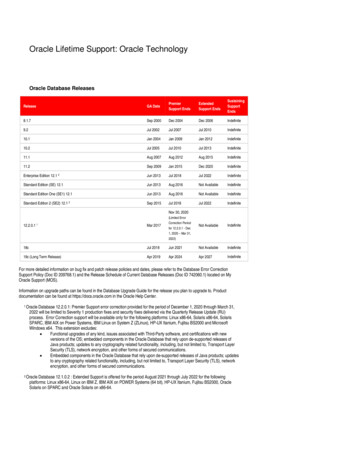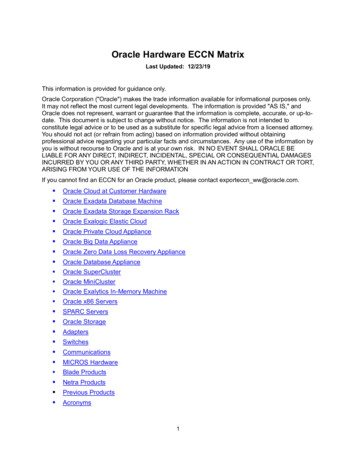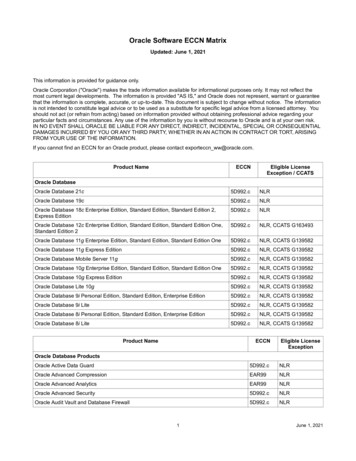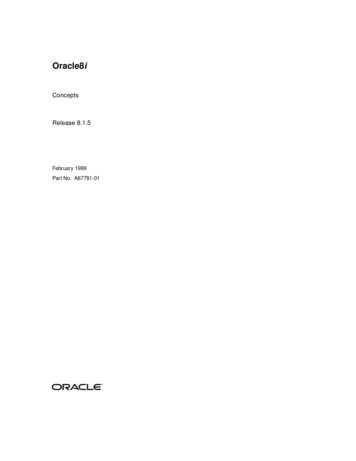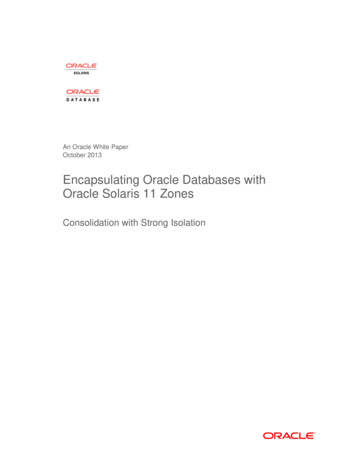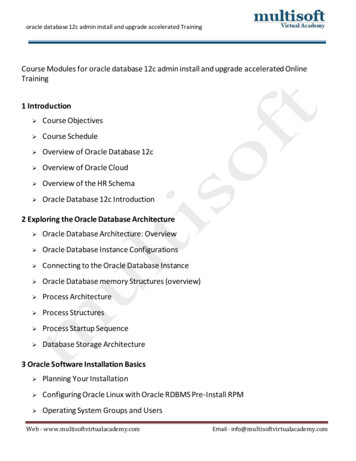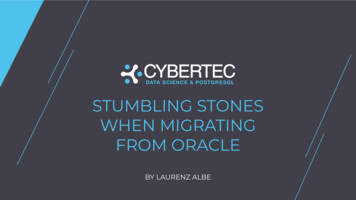
Transcription
STUMBLING STONESWHEN MIGRATINGFROM ORACLEBY LAURENZ ALBE
ABOUTME AND MYCOMPANY Who is Laurenz Albe? Who is CYBERTEC?
LAURENZ ALBESENIOR DATABASE CONSULTANT contributions to PostgreSQL and relatedprojects since 2006maintainer of the Oracle Foreign Data WrapperPostgreSQL support, training, consulting anddevelopmentworking for CYBERTEC since 2017MAILlaurenz.albe@cybertec.atPHONE 43 2622 930 22-7WEBwww.cybertec-postgresql.com
AboutInhouse developmentInternational team of developersSpecialized in data servicesOwner-managed since 2000
DATABASE SERVICESDATA SciencePOSTGRESQL Services Artificial Intelligence 24/7 Support Machine Learning Training Big Data Consulting Business Intelligence Performance Tuning Data Mining Clustering etc. etc.
CLIENTSECTORS ICT University Government Automotive Industry Trade Finance etc.
AGENDA Overview Understanding open source and PostgreSQL Migrate the schema (DDL) Data migration Migrating stored code Migrating SQL Migrating the application Migration tools
OVERVIEW
MIGRATION STEPS understand open source software and PostgreSQL migrate the schema (DDL) migrate the data migrate stored code (PL/SQL, Java) migrate SQL migrate the application
MIGRATION STEPS(ACTUAL SIZE) understand open source software and PostgreSQL migrate the schema (DDL) migrate the data migrate stored code (PL/SQL, Java) migrate SQL migrate the application
UNDERSTANDING OPENSOURCE AND POSTGRESQL
THE SHIFT TO OPEN SOURCE This is written by some enthusiasts in their spare time, right? Is this “enterprise ready”? Where can I get support? Why do I have to install and integrate so many different pieces ofsoftware (PostgreSQL, PostGIS, backup software, extensions, GUI clients,monitoring,.)? What if open source software is no longer maintained? It’s for free, so I don’t have to invest anything, right?
TRANSACTIONS, UNDO,MULTIVERSIONING both Oracle and PostgreSQL use multiversioning, so concurrency and lockingare similar (but not equal!)big transactions are no problem in PostgreSQL (but long transactions are), soless need to “batch” large transactionsno UNDO tablespace in PostgreSQL, no “snapshot too old”, immediate rollbackBut: UPDATE-heavy workloads are problematic in PostgreSQL (may need “HOTupdate” and autovacuum tuning) table size will grow (all that visibility information) I no statement-level rollback
SCHEMAS, USERS ANDSYNONYMSOracle has a reduced metadata model: a schema is always tied to a user with the same name ownership is determined by the schema only objects in your own schema can be referenced without schemaSynonyms are there largely to overcome these limitations can often be replaced by an appropriate search path setting for other uses, a view is usually just as good
VIEWS AND DEPENDENCIES Oracle tables be dropped/modified even if views depend on them views become “invalid” and cause an error when usedPostgreSQL is stricter about data integritySchema upgrade procedures more difficult in PostgreSQL but to make up for it, we have transactional DDLMaterialized View support much more sophisticated in Oracle replace ON COMMIT REFRESH with triggers in PostgreSQL
TABLESPACES tablespaces are important in Oracle Oracle essentially implements its own file systemPostgreSQL uses the host file system tablespaces are rarely necessaryResist the urge to create tablespaces during migration!
MIGRATE THESCHEMA (DDL)
DATA TYPE TRANSLATION PostgreSQL has way more data types, so the problem is often whichone to chooseDATE to date or timestamp(0)?NUMBER to integer, bigint, double precision or numeric? Oracle allows foreign keys from NUMBER(5) to NUMBER must take care to migrate them to the same data typeBLOB to bytea or Large Objects? easy, use bytea
DATA MIGRATION
GENERAL CONSIDERATIONS Oracle makes it hard to export data in clear text probably on purpose to make migration harderthis is often the least complicated step, but the one that causes themost down timereducing down time is difficult run migration of table data in parallel use “change data capture” for replication and switch-over withlittle down time (only available with commercial tools)
DATA MIGRATION PROBLEMS corrupted strings in Oracle (more common than you think!)invalid byte sequence for encoding "UTF8": 0x80zero bytes in Oracleinvalid byte sequence for encoding "UTF8": 0x00 can be filtered out during migrationinfinite numbers ( and - ) can be mapped to Infinity in double precision, problematicotherwiseMost of these problems have to be solved in Oracle before migration.
MIGRATING STORED CODE
MIGRATING PL/SQL PL/pgSQL is a clone of PL/SQL, but sufficiently different(e.g., RETURNS vs. RETURN)some tools provide automated translation, but a lot of manual work may remainno COMMIT/ROLLBACK in PostgreSQL functions, limited support in procedures often in “batched deletes”, can be omittedno PRAGMA AUTONOMOUS TRANSACTIONin PostgreSQL can sometimes be worked around with dblinkno BULK COLLECT with arrays process row by rowShift transaction management to the application.
MIGRATING PL/SQL PACKAGES option to use closed source fork from EDBworkaround: creating a schema with functions no “package global variables” and typesno large PL/SQL library in PostgreSQL move code to the application re-implement code in PL/Python or PL/PerlU extension “orafce” provides some compatibility
MIGRATING PL/SQL TRIGGERS has to be split in two parts: trigger function and trigger benefit: easier code reuseauto-increment triggers fetching from a sequence can be simplified tocolumn DEFAULTno “logon triggers” in PostgreSQL avoid or shift code to the application
MIGRATING SQL
WHERE DOES SQL OCCUR? application code ORMs and other abstraction layers reduce this views PL/SQL code column DEFAULT clauses index definitionsUsually requires manual intervention; migration tools may help.
SQL: JOIN SYNTAXSELECT b.col1, a.col2FROM base table b, attributes aWHERE b.id a.b id( );has to be translated toSELECT b.col1, a.col2FROM base table bLEFT JOIN attributes a ON b.id a.b id;Always simple, but annoying!
SQL: EMPTY STRINGS Oracle treats empty strings as NULLas a consequence,'hello' NULLis not NULL in Oracletranslate intoconcat('hello', NULL)or use “coalesce(strcol, '')”This is a very frequent problem.
SQL: CURRENT DATE/TIME most Oracle code uses proprietary functions: SYSDATE SYSTIMESTAMPhas to be translated: the literal translation would be clock timestamp() sometimes current date or current timestamp is bettereasy with search and replace
SQL: SEQUENCES Oracle code to fetch the next sequence value:asequence.NEXTVALPostgreSQL code to fetch the next sequence value:nextval('asequence')both don’t support the SQL standard way:NEXT VALUE FOR asequence
MIGRATING THE APPLICATION
MIGRATING THE APPLICATION can be hard hard coded dynamically composed SQL everywherecan be almost trivial use an ORM that supports both Oracle and PostgreSQLrequires thorough testingsome differences (transaction handling, concurrency) may causeproblems only during testing
MIGRATION TOOLS
POSTGRESQL FORKS some PostgreSQL forks (for example EDB) provide good compatibility but believe no claim of “drop-in replacement” carefully consider if you want to end up with closed sourceconsider using “orafce” for more compatibility open source, but still another dependencyit may be worth the effort to invest a little more and end up with freestandard PostgreSQL
ORA2PG the most widely used open source migration tool time-tested and proven, but not 100% bug freegenerates a DDL script, exports and imports data universally usable, but takes its timeattempts to translate PL/SQL simple search/replace, quality limited
ORA MIGRATOR open source, uses the Oracle Foreign Data Wrapperdirectly migrates data into the target database no export/import, therefore fasterrequires oracle fdw in the target database usually not an option with hosted databasesno attempt to migrate PL/SQLprovides a simple replication solution using triggers to reduce downtime
CYBERTEC MIGRATOR
CYBERTEC MIGRATOR commercial comfortable GUI driven migration fast, highly parallelized data migration high-quality PL/SQL conversion close-to zero downtime with change data capture under developmentMore /products/cybertec-migrator/
QUESTIONS?
MIGRATION STEPS (ACTUAL SIZE) understand open source software and PostgreSQL migrate the schema (DDL) migrate the data migrate stored code (PL/SQL, Java) migrate SQL migrate the application UNDERSTANDING OPEN SOURCE AND POSTGRESQL THE SHIFT TO OPEN SOURCE This is written by some enthusiasts in their spare time, right?
